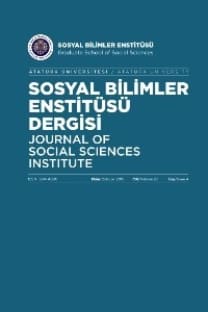Çok Kriterli Karar Verme Yöntemleriyle Kitlesel Açık Çevrimiçi Kursların Seçim Süreci
Selection Process of Massive Open Online Courses With Multi Criteria Decision Making Methods
Massive Open Online Course, Multi Criteria Decision Making, AHP,
___
- Bayrak, M. (2015, Temmuz). Öğretim Üyelerinin İnternet Üzerinden Herkese Açık Kurs Yürütme Eğilimlerinin İncelenmesi. Yüksek Lisans Tezi, Erzurum.
- Çakır, S., & Perçin, S. (2013, Ekim). Çok Kriterli Karar Verme Teknikleriyle Lojistik Firmalarında Performans Ölçümü. Ege Akademik Bakış, 13(4), 449-459.
- Demirci, N. (2014, Haziran). What is Massive Open Online Courses (MOOCs) and What is promising us for learning?: A Review-evaluative Article about MOOCs. Necatibey
- Faculty of Education Electronic Journal of Science & Mathematics Education, 8(1), 231-256.
- Eleren, A., & Karagül, M. (2008). 1986-2006 Türkiye Ekonomisinin Performans Değerlendirmesi. Celal BAYAR Üniversitesi İktisadi ve İdari Bilimler Fakültesi Yönetim ve Bilim Dergisi, 15(1).
- Ergüney, M. (2015). Uzaktan Eğitimin Geleceği: Mooc (Massıve Open Onlıne Course). Journal of Research in Education and Teaching, 4(4), 15-22.
- Glance, D. (2013, Mayıs 24). The teaching and learning foundations of MOOCs. Temmuz 8, 2019 tarihinde The Conversation: http://theconversation.com/theteaching-and-learning-foundations-of-moocs-14644 adresinden alındı
- Kop, R. (2011). The challenges to connectivist learning on open online networks: Learning experiences during a massive open online course. The International Review of Research in Open and Distance Learning(12(3)), 19-38. Haziran 24, 2019 tarihinde http://www.irrodl.org/index.php/irrodl/article/view/882 adresinden alındı
- Menteş, A. (2000). Manevra ve Sevk Sistemi Seçiminde Bulanık Çok Kriterli Karar Verme (Basılmamış Yüksek Lisans Tezi). İstanbul Teknik Üniversitesi Fen Bilimleri Enstitüsü, İstanbul.
- Monjezi, M., Dehghani, H., Singh, T. N., Sayadi, A. R., & Gholinejad, A. (2012). Application of TOPSIS method for selecting the most appropriate blast design. Arabian Journal of Geosciences, 5(1), 95-101.
- Ossiannilsson, E. (2014). Open learning arenas with an open culture of sharing -success factors. A. S. Antonio Moreira Teixera (Dü.), From Education to Employment and Meaningful Work with ICTs. Proceedings of EDEN Annual Conference. içinde Zagreb, Croatia: EDEN.
- Öner, A., & Ülengin , F. (1995). Silah Seçiminde AHP Yaklaşımı. I. Sistem Mühendisliği ve Savunma Uygulamaları Sempozyumu, (s. 1109-1122).
- Saaty, T. (tarih yok). Decision Making for Leaders. Pittsburgh: RWS Publications.
- Saaty, T. L. (1980). The Analytic Hierarchy Process. USA: McGraw-Hill International Book Company.
- Saaty, T. L. (1996). Dependence and Feedback The Analytic Network Process. Pittsburg, ABD: RWS Publications.
- Shyjith, K., Ilangkumaran, M., & Kumanan, S. (2008). Multi-criteria decision-making approach to evaluate optimum maintenance strategy in textile industry. Journal of Quality in Maintenance Engineering, 14(4), 357-386.
- Yurdakul, M., & İç, Y. T. (2003). Türk otomotiv firmalarının performans ölçümü ve analizine yönelik TOPSIS yöntemi kullanan bir örnek çalışma. Gazi Üniversitesi Mühendislik ve Mimarlık Fakültesi Dergisi, 18(1), 1-13.
- ISSN: 1304-4990
- Yayın Aralığı: 4
- Yayıncı: Atatürk Üniversitesi Sosyal Bilimler Enstitüsü Müdürlüğü
Çoklu Bölüm İçin Adil Hemşire Çizelgeleme
Muhammed Emre KESKİN, Elif KILIÇ DELİCE, Gökay AKKAYA
Covid-19 Salgınının Türkiye’de Aile İçerisinde Yol Açtığı Toplumsal Etkiler
Nuray KARACA, Erdi AKSAKAL, Cengiz KILIÇ
Heykel Sanatına Disiplinler Arası Bir Yaklaşım
David Hare’in Bakış Açısıyla İsrail-Filistin Çatışması: Via Dolorosa
Materyalizmin Satın Alma Tarzlarına Etkisi: Aksaray İlinde Bir Çalışma
Vesile ÖZÇİFÇİ, Ümmügülsüm AYHAN
Televizyon Yayıncılığında Büyük Veri
Yusuf DEVRAN, Ömer Faruk ÖZCAN
